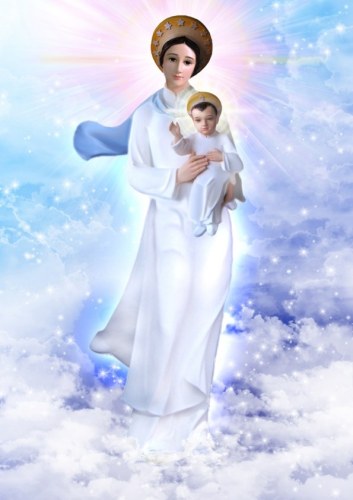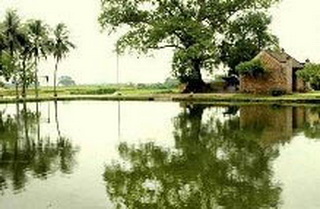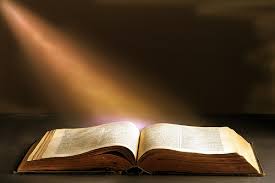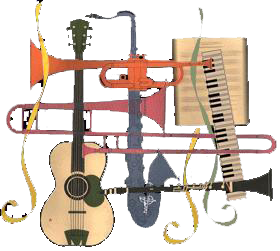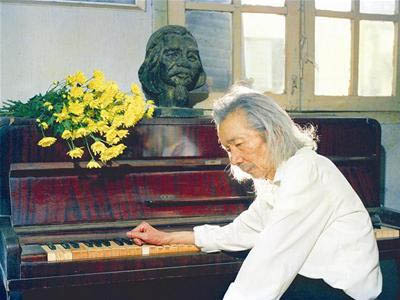
Văn Cao
And His Secret Mornings
Văn Cao (1923-1995) was a songwriter, a poet and a painter. Born into a middle class family, he had to drop out of school at the age of 15 after the premature death of his father who was the director of water utilities of the port city of Hải Phòng. After a short stint working as a post office clerk, he became totally devoted to music. He was one of the earliest and most prominent songwriters of the new westernized Vietnamese music (Tân nhạc), along with other luminaries such as Phạm Duy, Lê Thương, and Hoàng Quý. His first song " Buồn tàn thu ” (Mourning autumn’s death), written at the age of 16, is still popular in Vietnam today.
In 1942, Văn Cao moved to Hanoi, attended the Indochina Academy of Arts and published his stories and poems in the magazine Tiểu thuyết thứ bảy (Saturday Novels). His paintings were critically well received but were not financially successful, and the painter-writer-poet had to peddle his works on the streets of Hanoi and Hải Phòng.
Văn Cao joined the Viet Minh, a Vietnamese resistance movement against the French, in 1944. His first work as a revolutionary fighter was a march, Tiến Quân Ca (The Song of the Advancing Troops), which became the national anthem of communist Vietnam (North Vietnam, 1945, then unified Vietnam in 1976). His activities in Viet Minh went well beyond producing famous songs celebrating the life and struggle in the resistance (Làng tôi (1947), Ngày mùa (1948), Tiến về Hà Nội (1949), Trường ca Sông Lô (1947)). He was involved in assassinations, intelligence and logistics activities.
In 1952, Văn Cao was sent to the Soviet Union to study music, which changed his ideological convictions. His ascending political and artistic career in Hanoi came to an end in 1956 after his involvement with a harshly sanctioned movement for political and cultural freedom. However, in private, the poet remained very productive. Although he had to earn his living with menial jobs like drawing illustrations for book covers and cigarette packs, he wrote many poems in a secret note book, or even on discarded cigarette wrapping paper. His wife helped preserve them under her own handwriting, lest they might be lost from their author’s own memory. The following poem, “Five Mornings That Do Not Exist in the Real World”, tentatively translated into English, was reportedly written during that difficult period of his life, in 1960.
Only a few songs and poems were written in the last 20 years of his life. Among them, the song Mùa Xuân Đầu Tiên (“First Spring”; 1975) was most notable for its elegance and lyricism, during a period of self-congratulatory clamor and revolutionary exuberance following Hanoi’s takeover of South Vietnam.
Its theme, the coming of spring for the first time:
Rồi dặt dìu mùa xuân theo én về
Mùa bình thường mùa vui nay đã về
Mùa xuân mơ ước ấy đang đến đầu tiên
Với khói bay trên sông gà đang gáy trưa
Bên sông một trưa nắng vui cho bao tâm hồn
Then bustling with swallows comes spring,
This common season, this season of happiness has returned.
The spring we dreamt of is arriving for the first time,
With mist over the river, roosters crowing noon time
By the river, the warm afternoon sun bringing happiness to many souls...
It seems like a reprise, a continuation of the last stance of the poem “Five Mornings that Don’t Exist” 15 years earlier, which described a spring that did not exist in real life, only in the love between a man and a woman:
“Giữa hai cành non
Nghe nhựa mùa xuân
Những nụ hồng đang muốn nở
Và mật vừa thơm và ong đã tới
Chúng ta đi vào bí mật của mùa xuân”
Between two young branches
Listen to the sap of spring
Roses will soon be blooming
Honey smells sweet and bees have come
Let’s delve into the secrets of Spring
However, even then, after its appearance on the cover of a magazine back cover, the song had to be published, translated and recorded in Russia only, and was suppressed in Vietnam for many years.
In 1987, with the “đổi mới” (Renovation) movement introducing openness into Vietnam’s economic and political life, Văn Cao was officially allowed to resume his creative activities, and his previously banned works were again authorized for public performance. At the end of his life, the Vietnamese government bestowed on him many distinguished awards. He died of lung cancer in 1995 in Hanoi, and posthumously, streets were named after him in many Vietnamese cities.
His works include (2):
Songs:
● Bắc Sơn ( Bac Son is the name of a district of Lang Son Province, with picturesque mountainous landscape, in the North East of North Vietnam; site of Viet Minh resistance against the French in 1940’s)
● Bến xuân (music by Văn Cao, lyrics with Phạm Duy) (1942) (Springtime River Bank)
● Đàn chim Việt (Viet Bird Flock)
● Buồn tàn thu (1939) (Mourning Autumn’s Death)
● Làng tôi (1947) (My Village)
● Thiên Thai (1941)(Thien Thai is a Chinese mythic heavenly place from where only few visitors such as Lưu Thần, Nguyễn Triệu returned) (3)
● Tiến Quân Ca (1944) (Song of the Advancing Troops)
● Tình ca Trung du (Midland Love Song)
● Trương Chi (1943 ) (Truong Chi’s Love Story)
● Trường ca sông Lô (1947) (Lo River Epic Song)
● Mùa xuân đầu tiên (1976) (First Spring)
Poems
● Anh có nghe không (Do you hear?. Published in Giai phẩm Spring (Feb) 1956)
● Những ngày báo hiệu mùa xuân (Days with signs of a spring to come)
● Lá (1988) (Leaves)
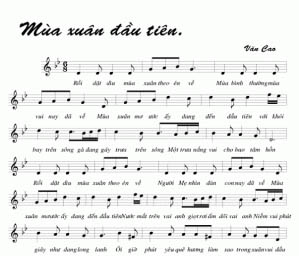
Năm Buổi Sáng Không Có Trong Sự Thật
Văn Cao (1960)
SÁNG THỨ 1
Một sáng ngủ dậy cả thành phố biến đi đâu mất
Không còn một bóng người
Im lặng
Những hồ nước sâu thăm thẳm
Mặt đất đỏ như màu gạch nung
Như mặt quả núi lửa
Anh đi tìm em
Tìm dấu vết của những con đường
Chúng ta thường đi lại
Và đi tới một nơi không còn gì để lại
Giữa mênh mông tôi gọi em mãi mãi
Thế kỷ chúng ta
đứng lại nơi đây
Em ở đâu?
Thế kỷ chúng ta còn đang tiếp tục
Trên trái đất này
hay dừng lại nơi đây
Giữa mênh mông tôi gọi em mãi mãi.
SÁNG THỨ 2
Buổi sáng nay không nghe tiếng chim hót
Buổi sáng không có trong sự thực
Tôi bước đi không nghe tiếng chân đi
và thành phố theo tôi cùng im lặng
Tất cả những con người
Chỉ thấy mắt đen lay láy
Cả tiếng xe chạy không thành tiếng
Tại sao, tại sao
Không ai nhìn miệng tôi đang gào thét không ra tiếng
Trong kinh hoàng tôi chạy điên dại
Một mình
Giữa thành phố mọi người im lặng bước
Tại sao, tại sao không còn tiếng nói
Không một tiếng động, không còn sự sống
Một thành phố sa mạc không nghe gió thổi
Những người như bị đẩy
Đi qua lại
Hình như cuộc sống nơi đây đã bị đày trong im lặng
SÁNG THỨ 3
Buổi sáng nay không phải mình thức dậy
Một người nào trong tôi đang thở
Trước mặt tôi buồn nửa ngày nửa đêm len lỏi
Nửa phố mặt trăng, nửa phố mặt trời
Từ khi ấy chúng tôi hai người suy nghĩ
Hai kẻ thù nhau
Hai thái cực tâm hồn
Hai người ấy trong một người chịu đựng
Mưu hại lẫn nhau
Vu cáo rình mò nguyền rủa chịu đựng
Không biết ngày đêm không biết thật hư
Từ phút ấy tôi không còn thật nữa.
SÁNG THỨ 4
Buổi sáng nay phố phường như mở hội
Một con người đeo mặt nạ đi chơi
Cuộc đời bên ngoài đang nhảy múa
vui lên cành non
Lá bàng trên phố dài màu ngọc
Xuân tháng hai
Các hàng rượu bên đường
Tơ lụa pha lê hoa giấy
Những mặt nạ gặp nhau chào hỏi
Bọt bia
Những em bé mùa xuân máu lên da thịt
Ngồi đập nút chai làm tiền bạc chơi xuân
Mở tròn mắt nhìn
Kinh ngạc
Họ vui làm sao
Ô kìa
Nước mắt mồ hôi
Sao chảy ra trên từng mặt nạ con người
Vội vàng lau mồ hôi và nước mắt
Trên mặt nạ giấy bồi.
SÁNG THỨ 5
Trong gian phòng trong suốt như thủy tinh
Những cánh cửa đều khóa chặt
Em ở đây với anh
Cho hơi lạnh sáng mùa xuân náo nức
Thịt da em cho anh sưởi
hơi ấm mình con chim khuyên
Trong lòng bàn tay
run rẩy
Giữa hai cành non
Nghe nhựa mùa xuân
Những nụ hồng đang muốn nở
Và mật vừa thơm và ong đã tới
Chúng ta đi vào bí mật của mùa xuân
Ngày đầu tiên của em trên biển.
FIVE MORNINGS THAT DO NOT EXIST IN THE REAL WORLD
FIRST MORNING
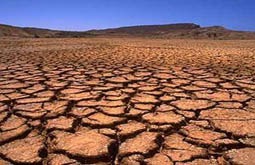
One morning I wake up the city has disappeared
Not even a shadow
silence
The lakes are deep
The ground is terra cotta red
Like a volcano’s surface
I'm going to find you
Find the traces of roads
We often took
And go to a place where there is nothing left
In this immensity I keep calling you forever
Our century
stops here
Where are you?
Our century still continues
On this earth
or stops here
In this immensity I keep calling you forever.
SECOND MORNING
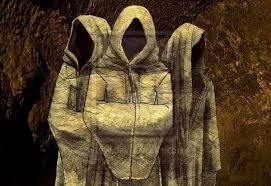
This morning I don’t hear birds sing
This morning is not real
I don’t hear my own footsteps
and the city stays silent with me
For all people
I can only see their black eyes shining
Even cars fail to make a noise
Why, why
No one looks at my mouth screaming without a sound
In terror I run possessed
alone
In the middle of the city people walk silently
Why, why no voice left
No noise, no more life
A city in the desert where you can’t hear the wind blow
People seemed to be pushed
Back and forth
Life here seems to be exiled into silence
THIRD MORNING
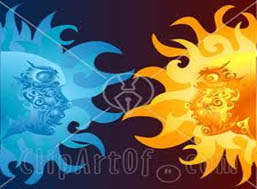
This morning it isn't me who woke up
Someone in me is breathing
In front of me sadness, day and night interlaced
Half of the street in moonlight, the other half sun bright
Since then the two of us with different thoughts
Who hate each other
Two extremes of a soul
These two people in one who suffers by them
Their plotting against each other
Slandering, spying each other I have to bear
I can’t tell day from night, the truth from lies
From that moment on I am not real anymore.
FOURTH MORNING
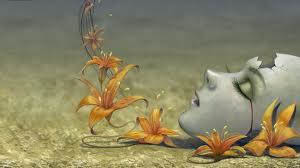
This morning the city streets seem festive
A man wearing a mask takes a walk
Life outside is dancing
Cheerfully on young branches
Turquoise tropical almond leaves line long streets
Spring in February
The roadside liquor stores
Silk crystal paper flowers
The masks meet and greet each other
Beer foam
Children enlivened with springtime fervor
Crush bottle caps to make tokens for their spring games
Open your eyes and look
Mystified
How happy they are
O look
Tears sweat
Why are they flowing on each man’s mask
Hastily they wipe sweat and tears
On their cardboard masks.
FIFTH MORNING
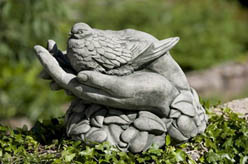
In the room transparent like glass
All doors are locked
Stay here with me
To enliven this spring morning cold air
Your body warms me
Like a songbird In the trembling palms
Between two young branches
Listen to the sap of spring
Roses will soon be blooming
Honey smells sweet and bees have come
Let’s delve into the secrets of spring
Your first day at sea.
Van Cao
Translated by Hien V Ho
11-20-2013
References and notes:
(1) Ba biến khúc của Văn Cao
href="http://www.baomoi.com/Ba-bien-khuc-cua-Van-Cao/152/6600633.epi">http://www.baomoi.com/Ba-bien-khuc-cua-Van-Cao/152/6600633.epi
(2) Wikipedia
(3) In China, it is known as the legend of the Tiantai Mountain (Tiantai County, Zhejiang Province). Liu Chen and Yuan Zhao were lost in the mountain and accidentally found a place inhabited by beautiful fairies. They married and lived with the fairies for only 6 months. Home sick, they asked permission to go back to their village knowing that there was no chance to return to Tiantai. On arrival to their native homeland, they discovered to their dismay that on earth time had gone by much faster, seven generations of their families had already passed, and all their relatives and acquaintances were gone.
http://www.chinafacttours.com/facts/tales/the-tiantai-mountain.html
(4) Nguyễn Thuỵ Kha: Nỗi truân chuyên của bài hát "Mùa Xuân Đầu Tiên" của Văn Cao. href="http://nhathonguyentrongtao.wordpress.com/2012/06/29/noi-truan-chuyen-cua-bai-hat-mua-xuan-dau-tien-cua-van-cao/">http://nhathonguyentrongtao.wordpress.com/2012/06/29/noi-truan-chuyen-cua-bai-hat-mua-xuan-dau-tien-cua-van-cao/
Hien V. Ho
12-21-2013


